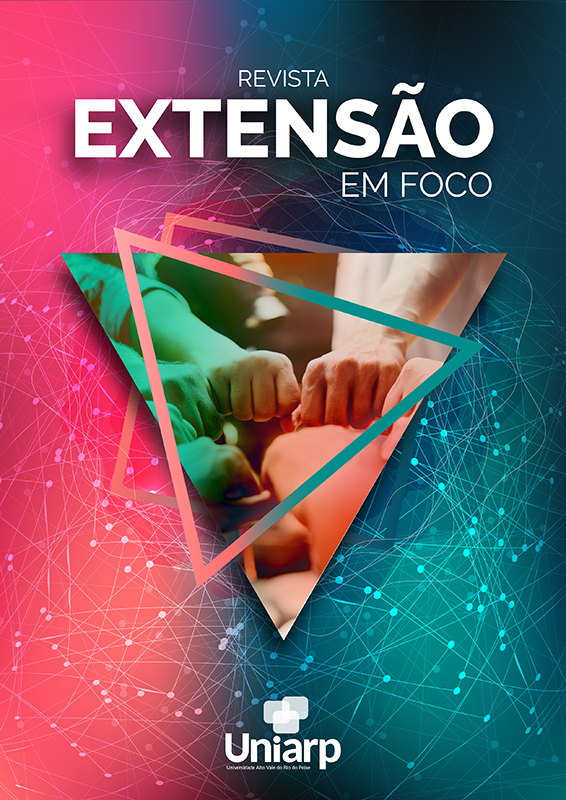INCLUSION OF YOUNG PEOPLE WITH DISABILITES IN REGULAR EDUCATION
FAMILIES’ VIEWS ON INCLUSION IN SCHOOL
DOI:
https://doi.org/10.33362/ext.v12i00.3566Keywords:
Deficiency, Social Inclusion, SchoolchildrenAbstract
This work was developed from an extension research project aimed at addressing the doubts and uncertainties related to the inclusion of young people with disabilities in regular education in public elementary schools in Caçador. The research analyzed the families' perspectives on this process and investigated how we can help schools overcome possible system deficiencies in the inclusion of these students. To collect data, a questionnaire was administered to 10 families, characterizing a cross-sectional study of qualitative nature, with an exploratory and descriptive approach. The data were obtained through the application of questionnaires during home visits. The extension project, in the field of applied social sciences, was developed in partnership with the Department of Education of Caçador and the Municipal School Maria Luiza Barbosa, located in Santa Catarina, Brazil. From the results obtained, it is clear that most parents view the inclusion of their children with disabilities in regular education positively but point out challenges such as learning difficulties and the need for more support professionals. The project highlighted the importance of family involvement and the continuity of extension projects to promote a more inclusive society.
References
CDPD. Convenção de Pessoa com Deficiência. Convention on the Rights of Persons with Disabilities. United Nations; New York, NY, USA: 2006. Disponível em: https://www.ohchr.org/en/instruments-mechanisms/instruments/convention-rights-persons-disabilities
DAN, Beáta Andrea et al. Family-SEN School Collaboration and Its Importance in Guiding Educational and Health-Related Policies and Practices in the Hungarian Minority Community in Romania. International journal of environmental research and public health, v;20, n.3, p.2054, 2023.
JANG, JongSik et al. Meta-analysis on the effectiveness of parent education for children with disabilities. World journal of clinical cases, v.11, n.29, p.7082-7090, 2023.
LONG, Toby; GUO, Jennifer. Moving beyond Inclusion to Belonging. International journal of environmental research and public health, v.20, n.20, p.6907, 2023.
OMS. Organização Mundial da Saúde. Disability. World Health Organization; Washington, DC, USA: 2023. Disponível em: https://www.who.int/news-room/fact-sheets/detail/disability-and-health
RENNER, Heidi M et al. Modeling Adolescent Social Inclusion to Improve School Completion.Journal of youth and adolescence, v.52, n.8, p.1662-1673, 2023.
SAHU, Anamika et al. Perception of Families of Children with Specific Learning Disorder: An Exploratory Study. Indian journal of psychological medicine, v.40, n.5, p. 406-413, 2018.
SANTILLI, Sara et al. Inclusive Socialization? The Relationships between Parents' and Their Child's Attitudes toward Students with Disabilities.International Journal Of Environmental Research and Public, v.19, n.24, p.16387, 2022.
SIMÓN, Cecilia et al. Attitudes Toward Inclusion and Benefits Perceived by Families in Schools with Students with Autism Spectrum Disorders. Journal of autism and developmental disorders, v.53, n.7, p.2689-2702, 2023.
TRYFON, Mavropalias et al. Parental perspectives on inclusive education for children with intellectual disabilities in Greece.International Journal Of Developmental Disabilities, v. 67, n.6, p.420-428, 2021.
VYRASTEKOVA, Jana. Social inclusion of students with special educational needs assessed by the Inclusion of Other in the Self scale. PloS one, v.16, n.4, e0250070, 2021.

Downloads
Published
How to Cite
Issue
Section
License
Copyright (c) 2024 Extensão em Foco (ISSN: 2317-9791)

This work is licensed under a Creative Commons Attribution-NonCommercial 4.0 International License.
Autores que publicam nesta revista concordam com os seguintes termos:- Autores mantém os direitos autorais e concedem à revista o direito de primeira publicação, com o trabalho simultaneamente licenciado sob a Licença Creative Commons Attribution que permite o compartilhamento do trabalho com reconhecimento da autoria e publicação inicial nesta revista.
- Autores têm autorização para assumir contratos adicionais separadamente, para distribuição não-exclusiva da versão do trabalho publicada nesta revista (ex.: publicar em repositório institucional ou como capítulo de livro), com reconhecimento de autoria e publicação inicial nesta revista.
- Autores têm permissão e são estimulados a publicar e distribuir seu trabalho online (ex.: em repositórios institucionais ou na sua página pessoal) a qualquer ponto antes ou durante o processo editorial, já que isso pode gerar alterações produtivas, bem como aumentar o impacto e a citação do trabalho publicado (Veja O Efeito do Acesso Livre).






